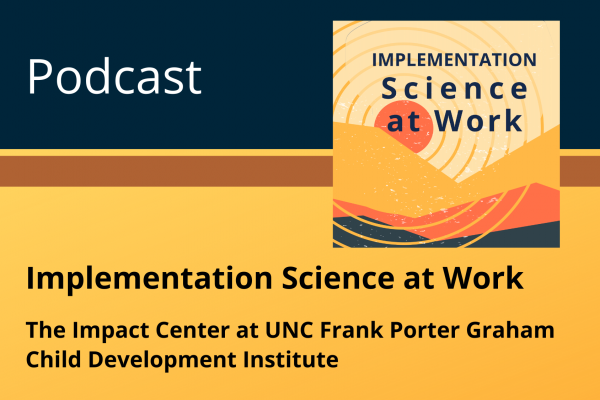
Digital content spotlight: Implementation Science at Work Podcast
The Impact Center at the UNC Frank Porter Graham Child Development Institute (FPG) is a collaboration of implementation scientists and support providers, researchers, evaluators, learning specialists, and communication specialists. Collectively, their work is grounded in principles of applying implementation science and best practices within a local context, nurturing long-term partnerships, and achieving social impact with a focus on effective prevention and well-being strategies for children, youth, and families.
In this digital content spotlight, we’re highlighting The Impact Center at FPG’s podcast, Implementation Science at Work, which launched in 2021 with the goal of sharing successful implementation stories and providing real insight into actual implementation science at work.
Podcast guests work with systems, organizations, and communities to implement and scale up programs in an equitable and community conscious way. Podcast episodes delve into questions and strategies meant to help listeners tackle community health issues, reduce health disparities, and improve community and population outcomes through implementation.
Below is a description of episodes to-date and their respective links. Make time to have a listen!
Episode 1: Community Engagement in Implementation Practice
This episode explores implementation at the community level, answering questions such as, “What do successful community partnerships look like?”, “How do you meet community members where they are?”, and “What does on-the-ground program implementation look like?”
Hosted by Meera Kumanan and featuring Will Aldridge, Pastor James D. Galliard, Lori Carter-Edwards, Qua’Tavia White, Molly Brown, & Dominique Campbell.
Episode 2: Equity in Implementation: From the Field to the Funders
In this episode, listeners learn about the Triple P Positive Parenting Program and how it is equitably adapted into different community contexts. You will also hear about how funding structures can support equity-driven implementation.
Hosted by Meera Kumanan and featuring Courtney Towne, Sara van Driel, & Gladys Hairston.
Episode 3: Co-creation in the California Foster Care System
This episode explores how organizations and systems can progress from hierarchical decision-making structures to co-creation that drives program and population outcomes. Discussants answer questions such as, "How does a system embedded in bureaucracy shift its power balance to include diverse voices in decision making?” and “What is adaptive leadership—and how can we use it to impact institutional bias and promote equity?”
Hosted by Alexis Kirk and featuring Mark Lapiz.
Episode 4: Policy Implementation: Creating Supportive Infrastructures and Systems
This episode considers the role of implementation in supporting systems to successfully translate policy for public benefit. You’ll hear about frameworks that inform policy implementation to reach desired outcomes, and get answers to questions like, “How is authentic co-creation a key part of policy implementation?”
Hosted by Meera Kumanan and featuring Robin Jenkins and Diana ‘Denni’ Fishbein from the UNC Frank Porter Graham Child Development Institute.
Episode 5: Planning for Sustainability
This episode centers around one of the biggest challenges in implementation science—sustainability. Discussants delve into the connections between program development, evaluation, equity, community engagement and sustainability, answering questions such as: “How do structural racism, community trust, program selection and adaptation influence whether a program is successful over time?”
Hosted by Meera Kumanan and featuring Rachel Shelton, Associate Professor, Sociomedical Sciences, Columbia University
Episode 6: Why We Can’t Self-Care our Way out of Burnout
This episode explores how to resist common solutions to burnout, the concept of community care, how organizations can promote workplace wellness, and how you can use familiar implementation practice strategies to start addressing burnout in the workplace.
Featuring Sherra Lawrence, Kimberly Maloney, and Jessica Reed, Implementation Specialists at the Impact Center at Frank Porter Graham Child Development Institute, UNC-Chapel Hill
What makes a good leader? In this episode, Cathy Henderson and James Wright from the Mecklenburg County Health Department in Charlotte, North Carolina share thoughts about good leaders, “not so good” leaders, challenges, as well as personal stories about who and what influenced their leadership journeys.
Episode 8: Looking into Implementation Support: Data, Quality Improvement and Program Success
This episode features Jessica Reed from The Impact Center and graduate interns Alden Parker and Tori Wierzchowski, who spent the summer of 2024 working with The Impact Center team. Reed, Parker, and Wierzchowski explore how implementation support contributes to Triple P program success and how data review contributes to quality improvement.
Episode 9: Readiness
How do we know if we’re ready to implement a new program or practice? In this episode, Adam Holland and Rebecca Roppolo, Implementation Specialists at The Impact Center, talk about readiness and implementation. They explore what it means to be ready, how this ties into personal and team motivation, and why there’s no better time than the present to get started.
Episode 10: Maintaining Vision During Times of Change
In this episode, state leaders who support and guide Triple P implementation in North Carolina share their thoughts and experiences on visioning and the unavoidable changes that come with shared leadership in complex systems
Featuring Anne Odusanya, Hope Newsome, and Ashley Bowen from the North Carolina Division of Health and Human Services